24th September 2022
The Spokesmen Cycling Podcast
EPISODE 307: Kidical Mass: How, Why, Where, When
SPONSOR: Tern Bicycles
HOST: Carlton Reid
GUEST: Kat Heath, Kidical Mass, Reading
TOPIC: Hundreds of “Kidical Mass” rides are taking place across the UK and Europe this weekend. A more family-friendly version of Critical Mass, these rolling demos show decision makers – with an abundance of cuteness — that children need safe space to cycle and that roads are theirs too. Kat Heath of Reading’s ride explains more.
TRANSCRIPT
Carlton Reid 0:13
Welcome to Episode 307 of the spokesmen cycling podcast. This show was published on Saturday 24th of September 2022.
David Bernstein 0:29
The Spokesmen cycling roundtable podcast is brought to you by Tern bicycles. The good people at Tern are committed to building bikes that are useful enough to ride every day, and dependable enough to carry the people you love. In other words, they make the kind of bikes that they want to ride. Tern has e bikes for every type of rider. Whether you’re commuting, taking your kids to school, or even caring another adult, visit www.tern bicycles.com. That’s t e r n bicycles.com to learn more.
Carlton Reid 1:04
Hundreds of critical mass rides are taking place across the UK and Europe this weekend. A more family friendly version of critical mass, these rolling demos showed decision makers with an abundance of cute purse that children need a safe space to cycle and that road of theirs to Kat Heath of Reading’s ride explains more.
Kat, you’re organising the Reading version of critical mass. First of all, what is Critical Mass is like a form of putting kids in the way of trouble because critical mass where does this come from, of course is famous for being quite an anarchic.
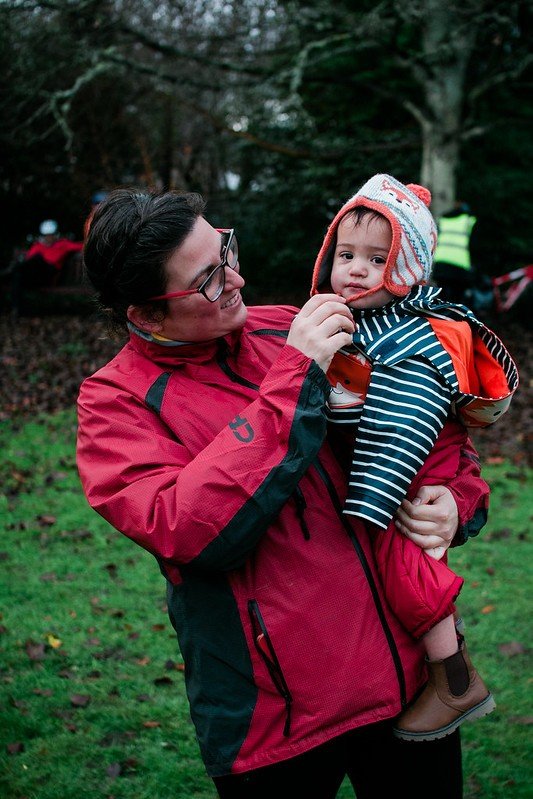
Kat Heath 1:52
So Critical Mass is a worldwide grassroots movement that is intended to say that cars, not cars, the street should be for kids not cars, and that we need better cycling infrastructure to make it safe for our children to cycle. If you imagine an eight year old cycling to school, for most parents, that’s absolutely terrifying. And that shouldn’t be the reality. They’re not designed with the same principle that critical mass has a lot of these rides are fun, fun, family friendly rides that don’t even go on the roads. Some people do want to use them more as protest rides, which is absolutely fine. But the heart of these rides is just trying to raise awareness of the diversity of people on bikes, and why we need better infrastructure. I think, a brilliant point that we consider that a city that is designed to be good for children is good for everybody from your pensioner who’s out on a bike because is there any mobility aid? I have a friend that has MS and having an electric trike has completely revolutionised his life. And he’s been able to maintain a degree of independence he just wouldn’t have otherwise. It’s just a good thing in general, I think. Does that answer the question? I ramble, you can tell me to shut down
Carlton Reid 3:06
and that’s fine. So is this by using kids using this perhaps the wrong word probe? But by involving kids? Is that a kind of wave of almost softening the message? Or is it that’s the absolute message we need to do this for kids?
Kat Heath 3:21
That is the absolute message, we need to have this for our children. I my little boy is 18 months now. But we’ve been cycling since he was five weeks corrected. And my ability to cycle with him completely changed how I could cycle I couldn’t cycle defensively like I used to. I couldn’t fit in gaps that were there before and I became I had to be in traffic because I had a trailer behind me. And there was just no way that I could like how I used to if your child is five years old, our setup just does not allow the children to cycle and they need to be at the heart of these decisions. I think the other thing that like is really key for why it’s so important for children. They are the people that are going to be living on this planet long after you and I have died. And the reliance on car travel at the moment is fueling climate change. We have an obesity crisis. We have a air crisis, air quality crisis and enabling active travel whether that scooting or cycling or walking or wheeling has to be at the heart of everything. At the moment most of our towns and cities are just not set up to support that.
Carlton Reid 4:31
So by riding with with your kids and with families and is that something that you can try to get local politicians involved? So you know, you’re basically the message is gotta go to them to improve anything in your in your city. Are you getting the media involved? How are you pushing this message apart from the actual ride?
Kat Heath 4:50
So again, this will change from group to group. So I helped form the one in Inverness and the one in Redding. So I can speak for both of those. We have actively invite It counsellors to all of the right and we’ve seen different parties turn off different frequency. Inverness and reading, we’ve got the right mic normally me or somebody else invited to a lot of like the clean air or the active transport committees, so that we can start being that voice for, hey, this is a great design, but that’s not going to work for a child. So let’s rethink this. I think also the Inverness ones especially, every council meeting, we heard different counsellors reference them about why active travel was so important. People that weren’t turning up to the rides were using us as a really good example of why the city needs to be designed better. It also just highlights awareness, I think the amount of people that have stopped and chatted to me and my son, when we had a trailer and now is on the back of my bike to say hi, I’ll be like, Oh my God, that’s a brilliant idea. I didn’t realise you could cycle with a child. I think that helps other parents that maybe aren’t as confident doing it as well. So you start having that knock on ripple effect.
Carlton Reid 6:03
That critical mass, famously, was like once a month. So how often is critical mass,
Kat Heath 6:10
again, depends on this is all local people. So it’s normally local parents, but not always raising it. And it’s how many marshals you can have. So marshals are there to keep the children safe when you’re cycling. We reading is working we’re working on now. So we do ours every other month Inverness, there’s monthly bath has a different frequency, it’s really dependent on the city or the town, and how much time the people organising it have got to do it.
Carlton Reid 6:39
And how many places around the UK and perhaps worldwide are organising critical mass.
Kat Heath 6:48
UK, there has been so Germany who are incredibly good at this have been organising worldwide events. So they had one in May, there was 11 towns and cities writing and I think that had doubled from the year before. In September, were aware there’s about 15 or 18 rides happening in September. So it’s growing little by little, I can find the stats from the last ride and actually email it to you. But there was over 100 I think almost 200 rides across Europe in May. So it is growing. And it’s coming to the point about like raising awareness, the more people see these happening, and the more we can get word out about these very fun and very cute events. And I think more people will start doing them. I hadn’t heard of critical mass until last year. And now I don’t stop talking about them.
Carlton Reid 7:41
And, again, that this will be a question that your answer will be, you know, it depends on each town. But if you give us a broad spectrum here of kind of the the amount of people that have kids matter, parents, how many people are attending these events, so So give me a flavour.
Kat Heath 7:58
I think it’s about 100 people. So including parents and children that are coming. school holidays have a surprisingly big impact, which I didn’t think through. But yeah, most of the rides that I saw in May, were about 100 people that said some rides had 200 London gets a lot more. So yeah. Yeah, about, I’d say 50 to 100 on every ride that I’m aware of apart from one last month, which where we had 10 people turn up.
Carlton Reid 8:31
Was that bad weather? What was the 10?
Kat Heath 8:33
Heat wave? Oh, like we Yeah. Also, I think we put it in the wrong location. And a lot of it’s trial and error. You try new things and school holidays.
Carlton Reid 8:47
What’s what’s the right location?
Kat Heath 8:50
For the rides? I, I got the same answer. It depends on what you’re trying to achieve. So I think if you haven’t done that many of them sticking to safer paths that you know, well, is a really good idea. Edinburgh to have, like, I think they had 200 people came and they were on the road. And they gave people lots of warning. And it was just fantastic to see children doing these beautiful routes, we tend to go from Park to Park, one of the things we’ve been trying to do and reading is highlight cycle routes that take you to areas that children actually want to be to help inspire parents cycle with their children.
Carlton Reid 9:31
Because if you did it on, say, an existing bike path that was already great. Yeah. Which is which would be fine for the kids to ride on already. But kind of not really promoting the message you’re trying to get out there is it’s like we want bike paths here. Not to use the existing ones which we know are okay for kids.
Kat Heath 9:52
I slightly disagree with that. I think highlighting good infrastructure especially if you’re trying to inspire more people to cycle is a great idea. At the same time, highlighting where there needs to be more, because it’s a massive gap. So you want to cycle to things like your hospital, to your doctor’s, to your schools, to your parks, I want to be able to cycle my kid to nursery and not have someone tried to run me over and then be able to go to a coffee place. And I think it all needs to tie in and be connected. Have you read invisible women, where it highlights that most carers which predominantly are women, we don’t tend to go A to B, we tend to have these A to B to C network journeys. And what we need to show is that we need connected networks with secure bike parking, that are segregated paths so that we can get everyone cycling. And there’s a million different ways of highlighting that. But it needs to be designed with accessibility in mind. And I think some plans assume a confidence level that not everybody has all that it will work for every that it will work for a single person on a bike. But then that doesn’t account for having a trailer, it doesn’t account for being a recumbent or traffic lights are a nightmare when my son is in a bad mood with me because he was my bike. And it’s just something you’d never find. And I’m not I don’t shoot the red lights, by the way. But it’s just finding what’s right for where you are and how engaged your active travel teams are and how engaged your counsellors are, and also the maturity of the cycling infrastructure in your towns and cities.
Carlton Reid 11:29
So what’s it like in Reading already?
Kat Heath 11:31
awful, it is absolutely awful. And reading, it’s like being in London 10 years ago. I’ve lived in London, I lived in London for when I was 18 when I was in my early 30s. And I cycled most of that time. And it feels like that here, the drivers are not prepared to see cyclists on the road, where they do see cyclists on the road like I regularly get sworn out, I regularly get driven at. I have had one guy scream at me with my kid on my bike to get on the effing pavement. I’m just like, that’s not even legal dude.
Carlton Reid 12:06
Kat, why would you in that camp? I’m being devil’s advocate here. In that case, why would you then inflict such an awful activity on on children, if you’re getting, you know, this kind of part of
Kat Heath 12:19
the reason they’re behaving like that is because we don’t have segregated bike paths. And they see us as an intrusion is the dog really annoying in the background?
Carlton Reid 12:29
There’s dogs, there’s dogs everywhere, don’t worry about it.
Kat Heath 12:32
Dogs, my sister. At the moment, some drivers and not all see us as a conflict were to be less than 2% of freaking road traffic. But if we had better segregated paths that were safe to use, more people would be using them, there’s less traffic on the road, it is better for everybody. And I think this is why Critical Mass ride and engaging with your counsellor. Any form of activism that argues for active travel is so important, because we need to get people out of cars for short journeys and onto bikes and, or onto scooters or onto whatever it is. But that’s not going to happen until the infrastructure is there. And if these rides can safely and in a fun way, highlight the need for that infrastructure that has to be a good thing. Which coming back to your question of whether it should be on the road or on pavements, non pavements on like in existing infrastructure, show a family a route that they wouldn’t have dreamed of, to get between their school and their part. And that to me as a win as much as it is getting highlighted highlighting the need for why this road needs infrastructure on it. It’s got to come from every angle. And it’s got to be fun. Because again, you’re right. Why would children and families turn up if it’s not fun, and they don’t feel safe?
Carlton Reid 13:49
So I’ve been on my local one which is was in Whitley Bay, North North Tyneside, I find I felt kind of awkward, because I was invited along to take photos. But I didn’t have kids. And well, I hadn’t I didn’t have kids there. So my kids are, you know, flown the nest and stuff. So and they’re riding their own bikes now in other cities. So I didn’t have like a tot with me. So I felt a bit awkward. So these rides, do they welcome everybody to join in? Or is it if you haven’t got kids, you can’t come along?
Kat Heath 14:19
I again, this is going to be on an individual talent level. All the ones that I am aware of that I have been involved in or that everybody is welcome. I think one of the ways we’ve marketed it as please come you don’t need a responsible child to look after you. If you don’t have a responsible child and you’re interested in marshalling please chat to us about that because we always need more marshals. But again, the whole idea is diversity. My parents live up in Inverness, and my poor dad every right I was like, Dad, I need you to come with mom on the tandem. Just so we can highlight that we have pensioners cycling it’s important to show diversity in every area. I’m the person that organises them in Exeter, the Powell doesn’t have any children. He just thinks that cycling should be safe for everybody, no matter their age group and loves critical masses. So he’s led on organising one that everyone is genuinely welcome, the more people we have out there, and the friendlier these things are, it’s got to work for everyone, right. And one of the things I’ve been discovered when I talk to taxi drivers, and this is their living like livelihood, they obviously get anxious when we talk about or anyone talks about shutting down city centres. But actually, if you had less cars there and you had more bikes, the people that did need to get into there, we’ll be able to use the taxis or we need to start engaging everybody in his consultations and making sure that the best solution for the future is heard in my opinion. And we’re not doing that because we’re prioritising people’s convenience about using a metal box over our children’s future. And like I don’t, I don’t know how old you are. But if your children have flown the nest, probably, like, not in your 20s anymore. Like when I grew up, we had water fights in the street, and I could psych on the street. I’m teaching my little boy how to walk right now. And I hate taking him down our quiet road because the cars are parked everywhere, there’s cars racing up and down a residential street and it just doesn’t feel the safe area that I grew up in. And my dad was Army. So we grew up in villages and cities and towns like we moved a lot. But that’s not our children’s reality anymore. Because our streets are for our cars, not for our communities.
Carlton Reid 16:30
Let’s let’s dig down into any differences between this and critical mass because I’m, I’m struggling to see how it’s actually any different apartment, maybe there’s ice creams at the end and that kind of stuff. There’s more entertainment. Yeah, there’s like there’s the kind of that that blackmail at the end to get the kid to come. Because at the one at Newcastle, the one on the way into it was like we’re going to have an ice cream van at the end. And it was free, free brownies and stuff. It’s like okay, that’s not on critical mass. That’s that’s the difference. But just generally what what genuinely is the difference between because the describing events are actually pretty much similar.
Kat Heath 17:07
I think they come from the same ethos Critical Mass is started to raise awareness of the amount of people that were dying by bike. And sadly, that hasn’t dramatically changed has. To me, the main difference is someone’s organised both is the amount of planning that has to go into a critical mass. Critical Mass is you say a name a day, and then you cycle together. And you’ve got grown adults that know how to cycle. And you don’t have to worry about it as much critical mass we spend months sometimes figuring out routes that we can keep our kids safe on other people’s kids safe on accessibility as a huge issue for critical mass. Again, them having fun and enjoying this. So they want to carry on cycling outside of critical mass here is a thing. I do think it is a there is a lot of anger towards cyclists or people on bikes. And I think critical mass helps with that, because it shows that some of these people on bikes are children on bikes, and it is very difficult to have the same level of anger. So I think it raises awareness in a more positive tone potentially, then critical masses due and Critical Mass is a great fun. And I love attending them. And they still have the same bribery at the end, by the way, because they finish in a pub, what’s really the adult version of offering an ice cream. But they are all raising awareness that our roads aren’t just for cars, and it needs to be safe for all people on those roads, not just people in a metal box.
Carlton Reid 18:47
So Critical Mass is that famously, there’s no organisers of it are meant to be no organisers of it certainly no organisers who are named and can be contacted in in any named way. Whereas Critical Mass is very much you know who the organisers are? Yeah. It’d be easier for the police to come in and just stop this. So do you have to approach the police? Do you what do you have to do as an organiser to actually organise these things with your name on
Kat Heath 19:17
so we have recommendations on this you. We recommend you get in contact with your police force and let them know at least six days beforehand. Some of the police forces have been amazing sunrise, the police force are coming out and acting as marshals. Other ones there’s been more of a debate. I think one of the things if you are cycling on the road, you’re not holding up traffic, you are the traffic and that’s a really big thing to remember. You don’t have to ask permission you need to inform people that these rides are happening. In my experience, informing the council as well has been really, really positive. You don’t have to but in Vaness Council and Reading Council have been really, really helpful with us. In Venice, we had a problem with the route. And the event planning and road team helped me find an alternative route and got the permission to go through this area that was closed off by a private company. So we can keep the kids safe in reading, we were using a non we were using a lovely Riverside path, a part of the road that was completely overgrown with stinging nettles and I let them know and they went and cut it down for me. So I think there’s a huge benefit in working with your counsellors, but that very much depends on your councils and your relationship with your councils. I product managers live as a job. So communication and coordination and getting people to work together, I find makes anything in life work easier. But again, that comes down to your relationship in the city or town.
Carlton Reid 20:51
So the city or town that you’re in reading, have you seen any change? So organising these critical mass event? Have you seen any inkling that there might be some differences coming up? Or do you think this is a multi year, your child will be 23? Before you even get anything in? What do you see is the the progress?
Kat Heath 21:11
So I only moved down in February, I came down from m&s and wanted them here. So I said I’ve set them up here. I think the fact that we are sitting on council groups now is a great sign. So we can input on consultation, these things aren’t going to happen overnight. It can’t be 23 years. We just don’t have the time anymore. We are at a critical point in climate emergency. And we need to get more people doing short routes by active travel. Don’t expect it to happen overnight. Like realistically these infrastructure changes we’re talking about we’re talking years, not months. But I do think we need to start seeing changes a lot earlier than 21 years. And when I hear visions for 2035, or 2050 is like that, that’s too far away for my kid. I’m a very effective product manager. So I basically decided to take this approach with these.
Carlton Reid 22:14
Hmm, and how much organisation does it take and you get an inkling before that it takes more than a critical mass. But just just tell us exactly what you have to do.
Kat Heath 22:26
A high level you need a few people involved, definitely. You want to you need a route, you need a route that is safe for children and accessible for children. And just thinking things through like drop curbs. Or if you’ve got bollards, where you’d be able to get a trailer through or how a tandem would work. So a lot of route planning and that tends to be where the most focus is spent. You need marshals. So when you have kids going past junctions, just having a martial there to make sure someone doesn’t inadvertently or intentionally drive into the middle of the children, because they are like some of these kids are four or five on a balanced bike. And that’s not going to keep them safe. You need cake. So encouraging people to bake stuff. They’re fun, right? You do need that. What else telling the place that you’ve suggested is a good option. We’ve written a how to guide. We’ve also sorted public liability insurance. So people anyone organising critical mass can sign up to public liability insurance, which you don’t need to. But in my opinion, is a sensible idea to do. I think yeah, maybe and then you need to promote it. And whether that’s Facebook or parents, WhatsApp groups, talking to the local media, talking to the national news media, hopefully, I think it’s just raising awareness and getting people to turn up on the roads. That is most of it, find a safe route. Tell people about it. Make sure you’re keeping the kids and other vulnerable users safe.
Carlton Reid 23:57
I should be asking the kids this, but for obvious reasons. I can’t but what are kids think about this, this these rides.
Kat Heath 24:03
So mine doesn’t talk yet, but he seems to love cycling. He is so content on my bike is incredible. I can share a five year olds account of the last critical mass from one of the other organisers and he absolutely loves it. His main question after the last one was when’s the next one? Going back to Inverness. Some of the other people. Their children’s spoke to STV about what they thought about it and why these rights were important. And overwhelmingly the kids love it. They get to cycle they get to spend time with their friends on bikes, their parents on bikes and they’re safe. And then they get coke at the end or the he invested a lot working with 42 cycling to have ramps like mountain biking ramps so they could get exposed to that they got a pennyfarthing and a lot of the riders do have fun at the end and I think that’s me highlight head just how much we’ve lost that as well. Like you don’t play out on the street with your friends anymore because you can’t. And having those play out areas at the end have become a really important part for some rides on having that sense of community. But
Carlton Reid 25:17
yes, the ride I went on Whitley Bay was ended at a at a play park basically. So the kids could just leap in there, you know, jump off their bikes and go play together, which was, which was very cute. You mentioned before about the abuse, the sadly, the abuse that you get when you’re riding your bike, when you’re on the critical mass. Do you get any abuse from drivers then? Or is it the fact that there’s quite a lot of kids and parents on their bikes actually stopped any abuse?
Kat Heath 25:46
Very, very little. So I’ve probably done 11 right across in Vanessa reading. And I think maybe two or three drivers I’ve seen have been annoyed with the ride. For the most part, you just get these huge smiles and a few curious what’s going on. If you’ve been to the ride, it is a lovely, lovely thing to see small children on their bikes or on their parents bikes, ringing their bells or smiling. And for most people, I think it just makes them smile. We Inverness had a thing with the hospice, we went past the hospice room, and some of their patients would request to come over to the hospice window so they could see it. Because honestly, they just really enjoyed seeing it. I think the aggression towards cyclists has changed. I get a lot more aggression now than I did even 1015 years ago. A lot less sexual comments. But a lot. I mean, it could just because I’m older, right? But a lot lot more aggression than I did a few years ago, which is bizarre.
Carlton Reid 26:52
Yes, yes, it is very sad turn of event. And how long are these rides?
Kat Heath 26:57
In general? Three miles ish. You’ve got people on small wheels. Yeah, in general, just think through your target audience if you’ve got a small bike, a very small ride for you. Isn’t that small and also getting to them and leaving as well.
Carlton Reid 27:16
And when is the next event for you personally in Reading?
Kat Heath 27:19
Our next one is on the 25th of September as part of the European Critical Mass weekend. We’re going to do a combined ride so working on are going to start and then they’re going to join us at 1130 and Palmer Park, where we are going to ride together to finish at the reading Bicycle Festival where there will be cake and but also some stunts and tracks and cargo bikes so people can really see the breadth of bikes bikes available to them.
Carlton Reid 27:49
Thanks to Kat Heath there And thanks also to you for listening to Episode 307 of the spokesmen cycling podcast brought to you in association with Tern bicycles, show notes and more can be found as always on the-spokesmen.com. The next episode will be out next month. But meanwhile, get out there and ride…
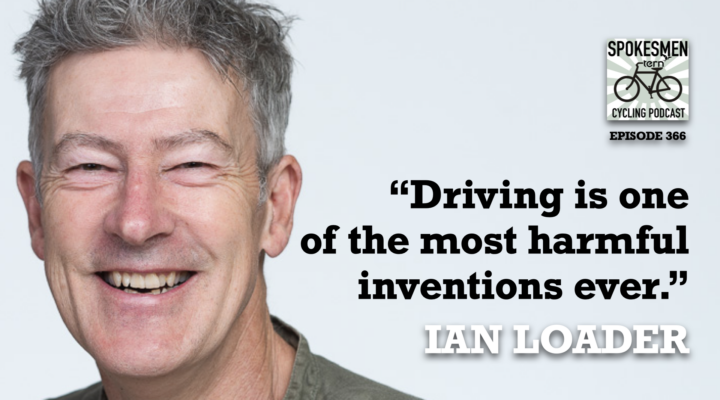
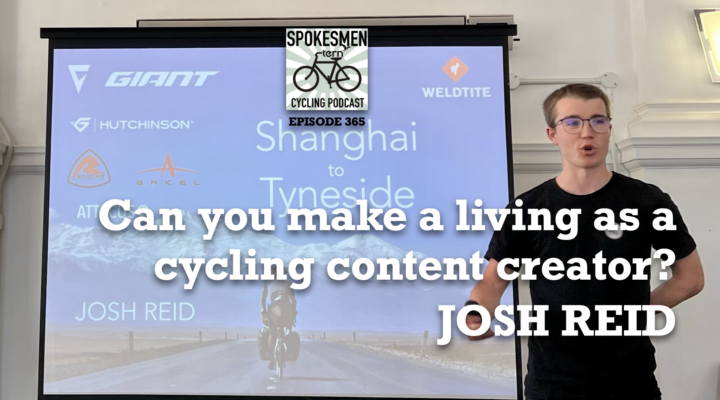
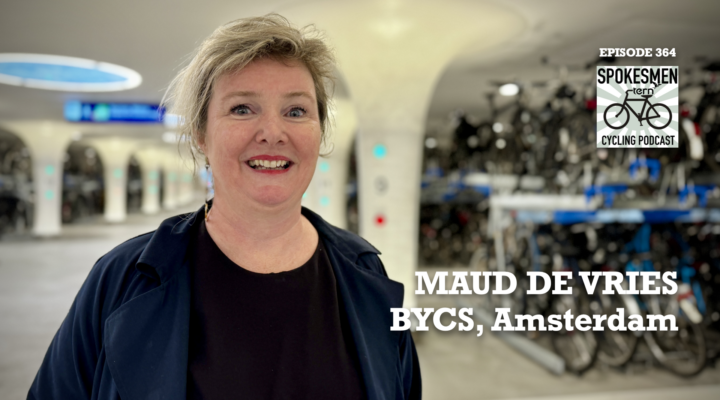
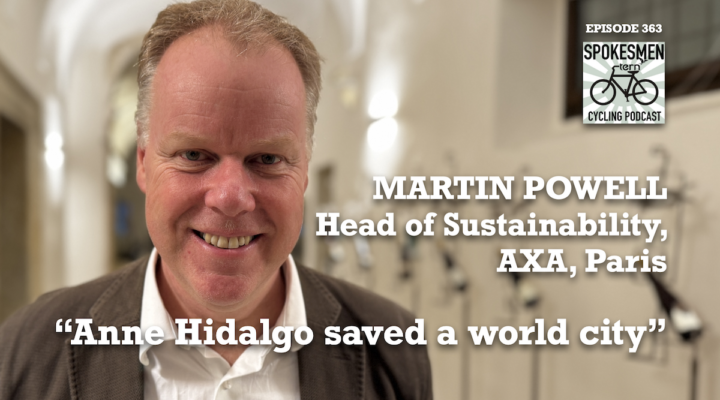
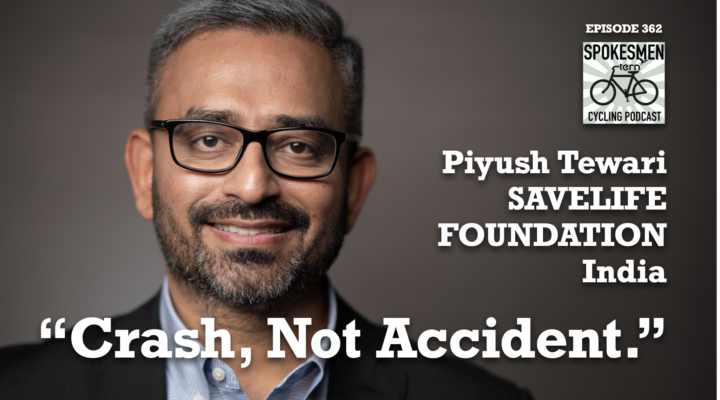
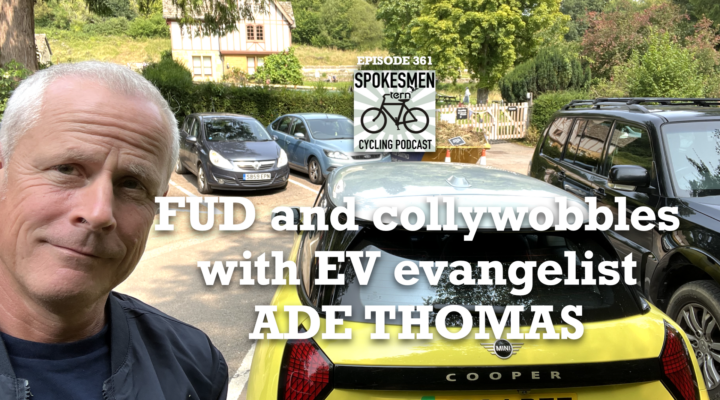
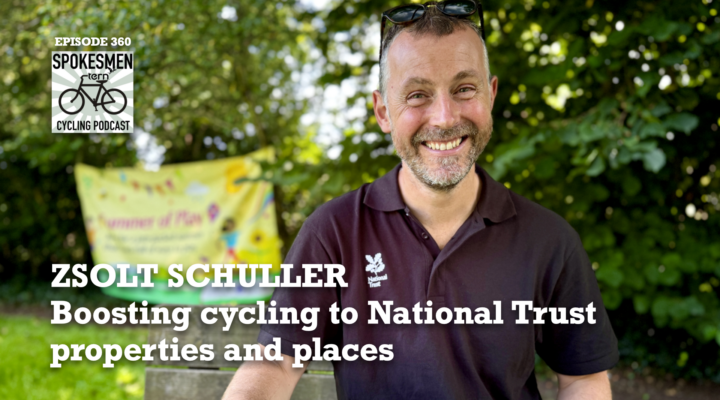
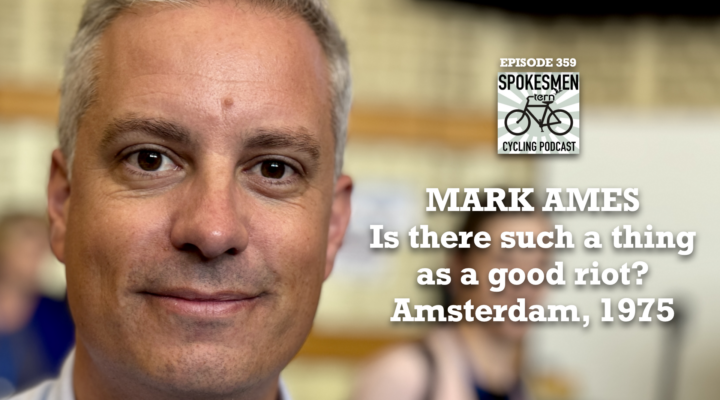
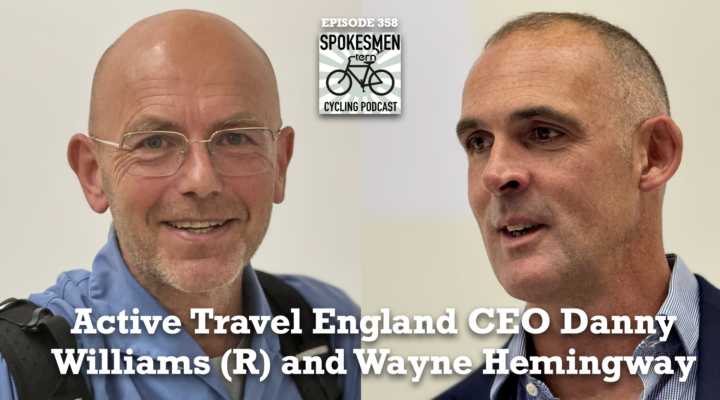
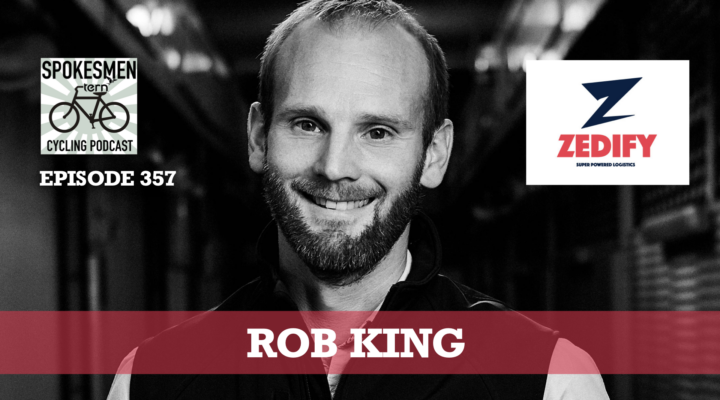
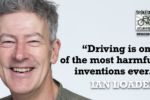
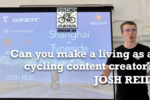
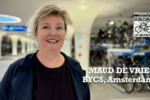
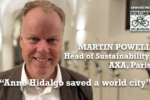
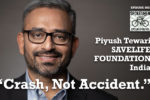

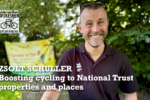
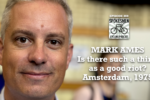
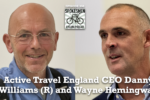

Be First to Comment